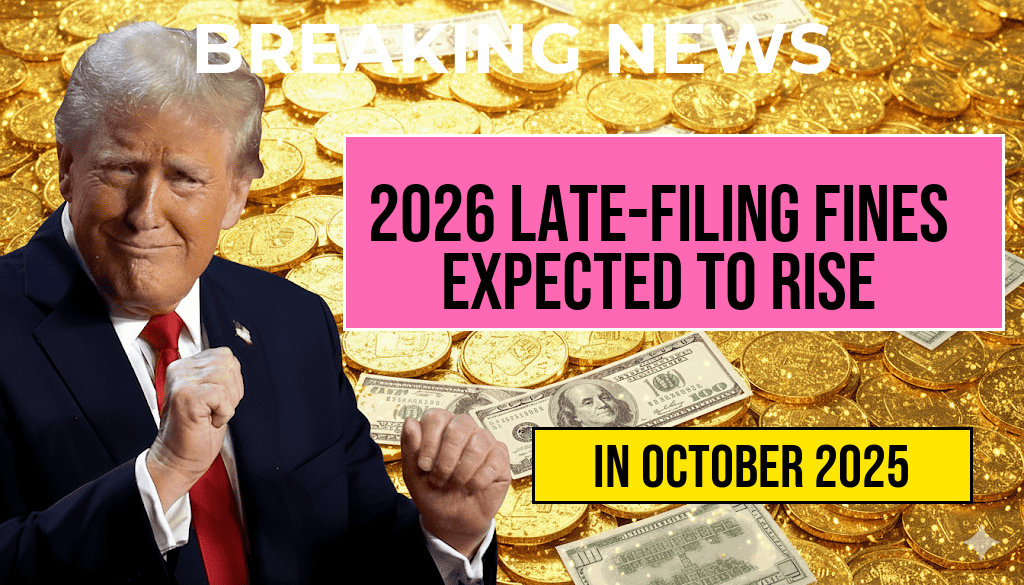The IRS is projecting a significant increase in penalties for late tax filings in 2026, which could result in taxpayers facing fines that add hundreds of dollars to their tax bills. As the U.S. government seeks to streamline tax compliance and improve revenue collection, the adjustments in penalty structures are expected to disproportionately affect those who file their returns after the deadline. With the current penalties already a burden for many, this upcoming change raises concerns among taxpayers about the financial implications of late filings.
Understanding the New Penalty Structure
The Internal Revenue Service (IRS) has announced new guidelines regarding penalty assessments, which will take effect starting in 2026. The changes are part of an effort to align penalties with inflation and ensure that they remain a deterrent for late filers. According to IRS officials, the updates aim to simplify the penalty system while ensuring compliance among taxpayers.
Current Penalty Framework
As of now, the penalties for late filing are as follows:
| Type of Return | Fine for Late Filing | Fine for Late Payment |
|---|---|---|
| Individual Returns | $435 or 100% of the unpaid tax, whichever is less | 0.5% per month on unpaid taxes |
| Business Returns | $850 or 100% of the unpaid tax, whichever is less | 0.5% per month on unpaid taxes |
These penalties can accumulate quickly, especially for individuals and small businesses that may need additional time to gather necessary documentation. The IRS has acknowledged that many taxpayers are unaware of the consequences of late filing, leading to unexpected financial burdens.
Projected Increases in 2026
The IRS has indicated that the penalties could see an increase of approximately 25% in 2026. This adjustment reflects a broader trend of increasing penalties to keep pace with inflation and changing economic conditions. For example, an individual who files late could see their penalty rise from $435 to around $544. Similarly, businesses could expect their fines to increase from $850 to approximately $1,063.
- Individual Filers: Current penalty of $435 may rise to $544.
- Business Filers: Current penalty of $850 may increase to approximately $1,063.
Moreover, the late payment penalties are also expected to increase, with the IRS suggesting a potential rise from 0.5% to 0.6% per month on unpaid taxes. These changes could lead to a substantial increase in final tax liabilities for many taxpayers.
The Impact on Taxpayers
For many taxpayers, these impending penalty increases could create financial strain. Individuals and small business owners often face various challenges that can delay their ability to file on time, including unexpected expenses and lack of access to necessary documentation. As the IRS ramps up its enforcement mechanisms, it is crucial for taxpayers to stay informed about their filing responsibilities to avoid these costly penalties.
Strategies to Avoid Late Filing Penalties
Taxpayers can take proactive steps to minimize their risk of incurring late penalties:
- File Early: Preparing and filing taxes early can help avoid last-minute issues.
- Use Professional Help: Hiring a tax professional can ensure that all aspects of your return are handled correctly.
- Request Extensions: If more time is needed, filing for an extension can provide additional time to gather documents without incurring penalties.
Conclusion
The anticipated increase in late-filing penalties by 2026 signals a shift in how the IRS approaches tax compliance. By understanding the new penalty structure and taking proactive measures, taxpayers can better prepare for their financial obligations and avoid additional costs. For more information on tax penalties and filing requirements, you can visit the IRS website or check resources such as Forbes and Wikipedia.
Frequently Asked Questions
What are the projected late-filing penalties for 2026?
The projected late-filing penalties for 2026 are expected to significantly increase, potentially raising your tax bill by hundreds of dollars if you do not file your taxes on time.
How will these penalties affect my overall tax payment?
The increase in late-filing fines may add substantial amounts to your overall tax payment, making timely filing more crucial than ever to avoid these extra costs.
What can I do to avoid late-filing penalties?
To avoid late-filing penalties, ensure that you file your taxes by the deadline, consider filing for an extension, and consult a tax professional for guidance on your specific situation.
Are there any exemptions to the late-filing penalties?
While certain circumstances may provide relief, such as natural disasters or significant life events, it’s essential to check with the IRS or a tax advisor for any specific exemptions that may apply to your case.
What should I do if I can’t pay my taxes on time?
If you can’t pay your taxes on time, it’s important to file your return anyway to reduce penalties. You can also explore payment plans or options available through the IRS to manage your tax liabilities effectively.











